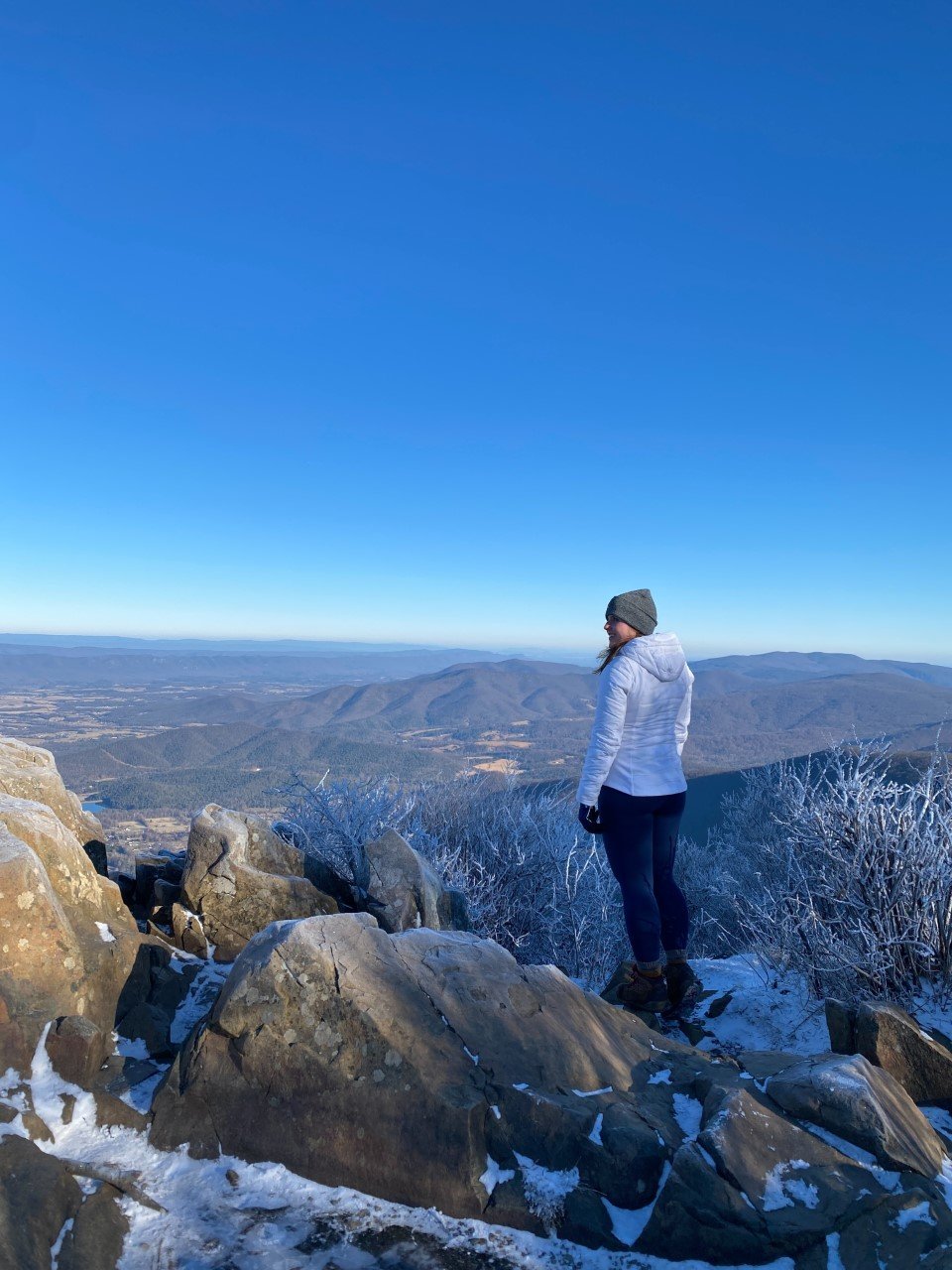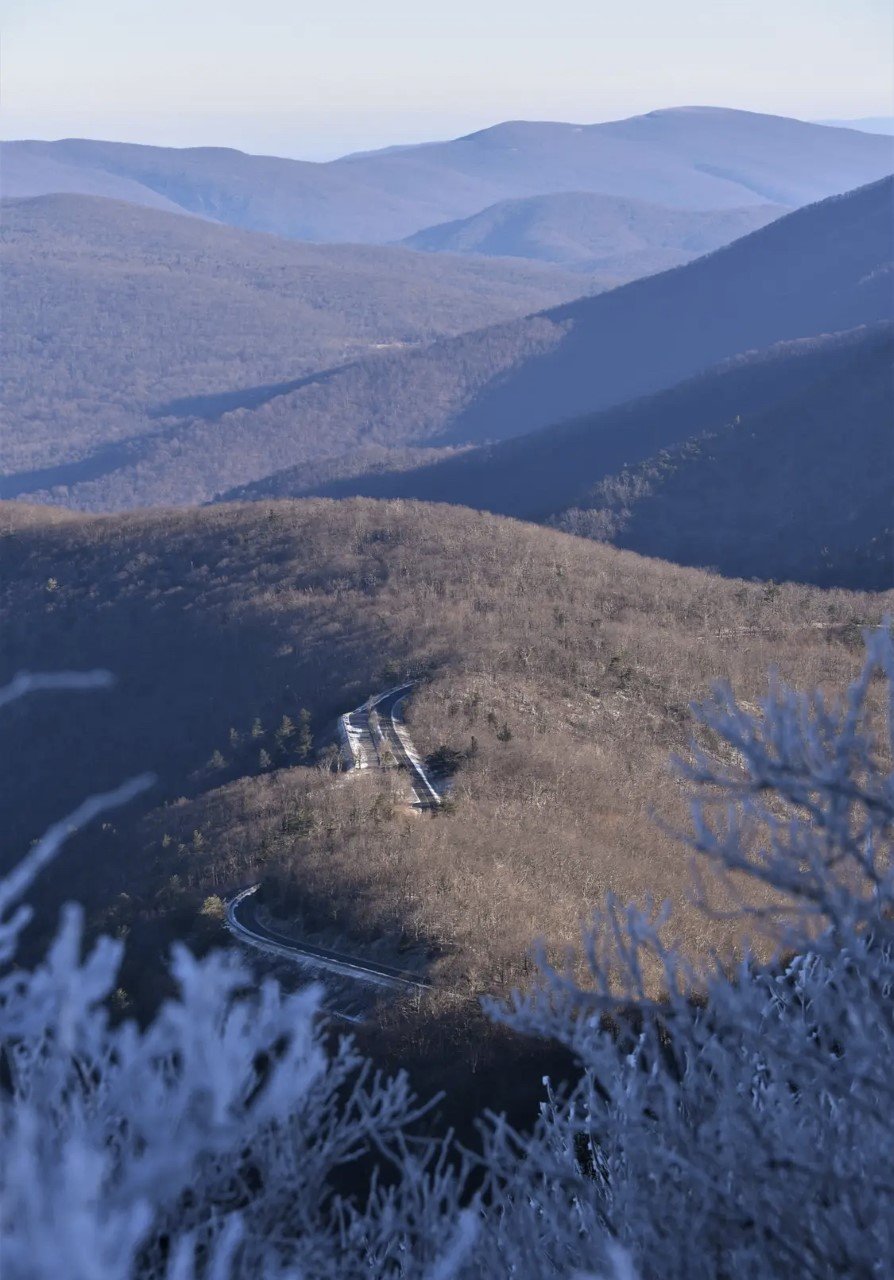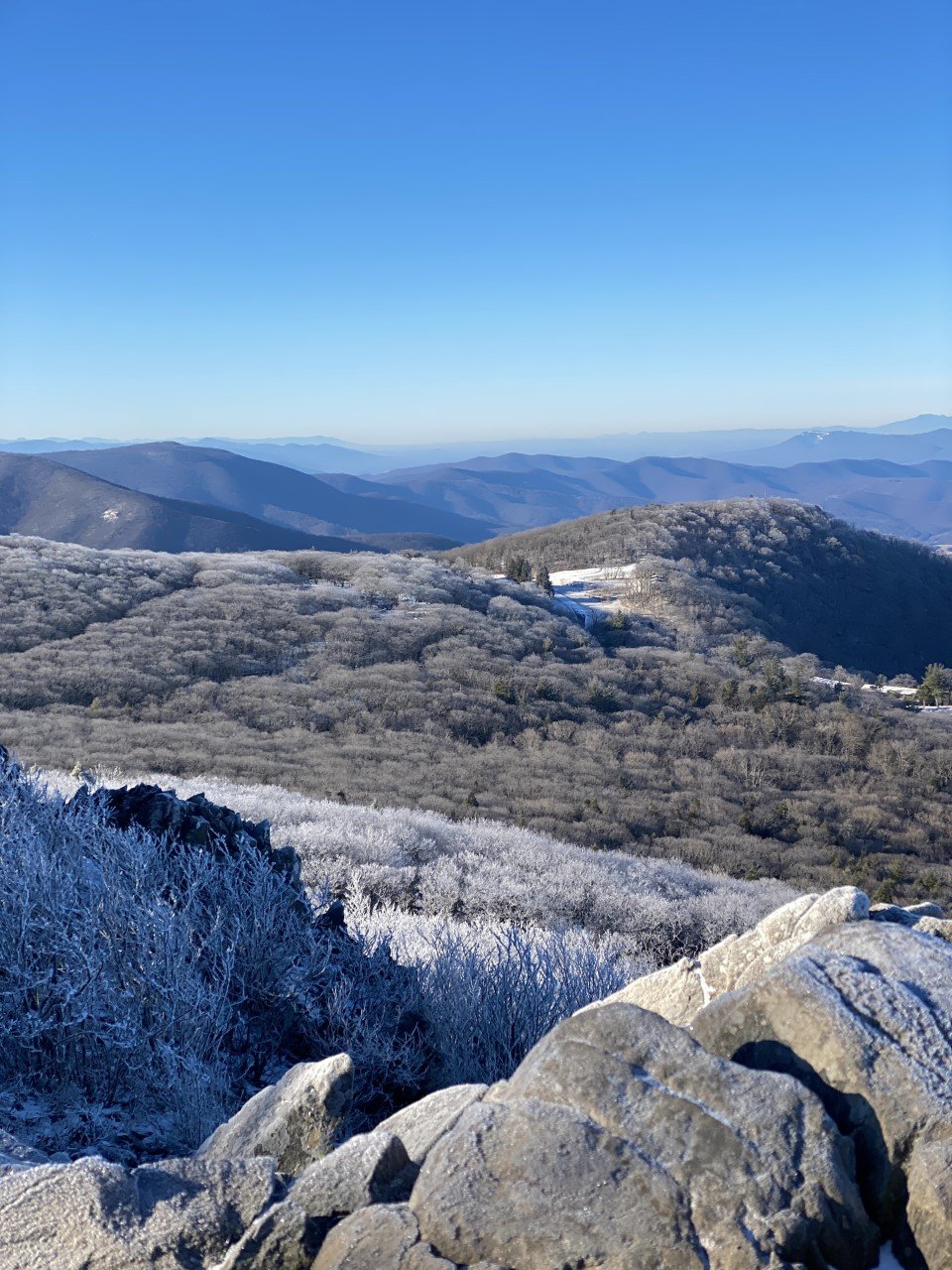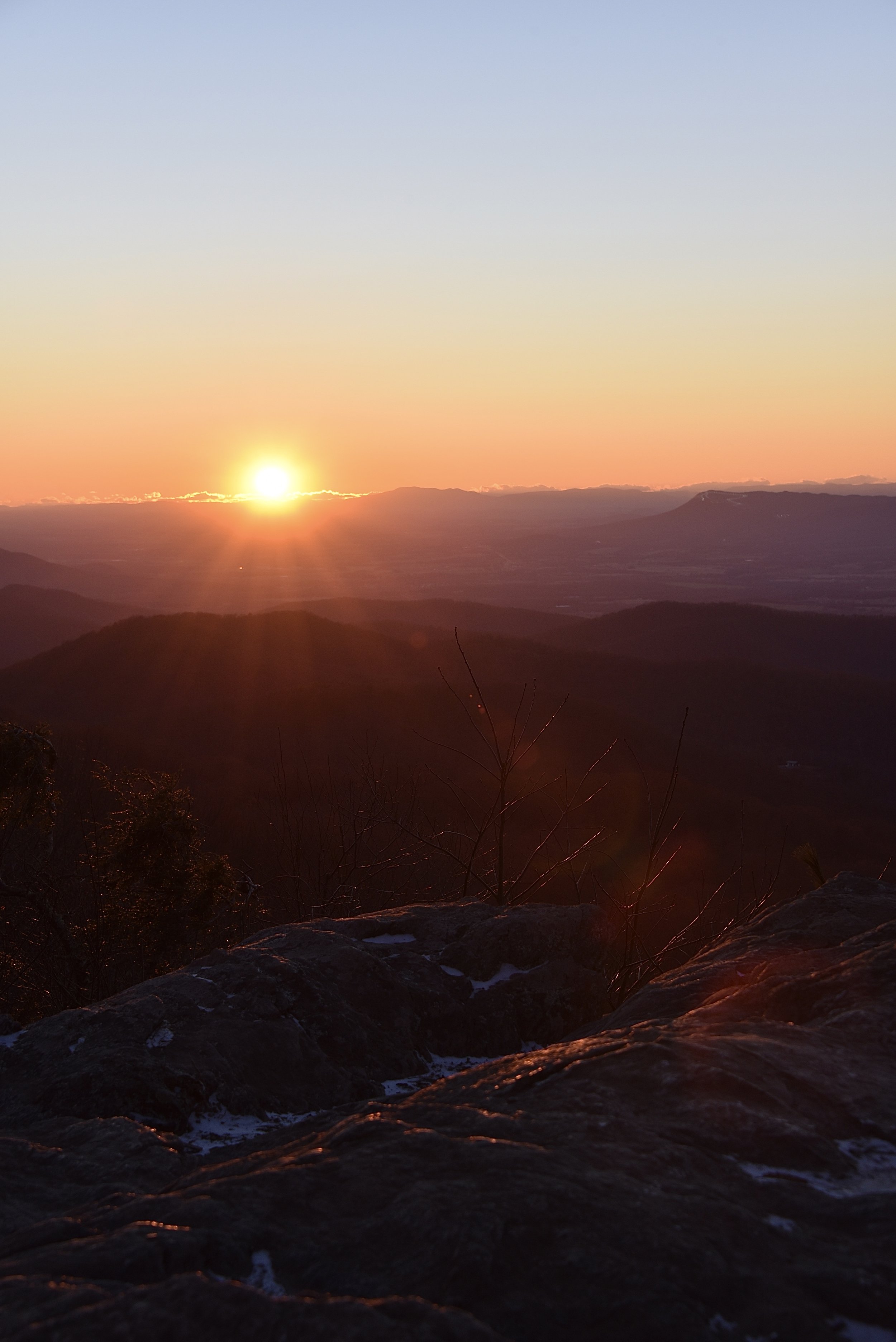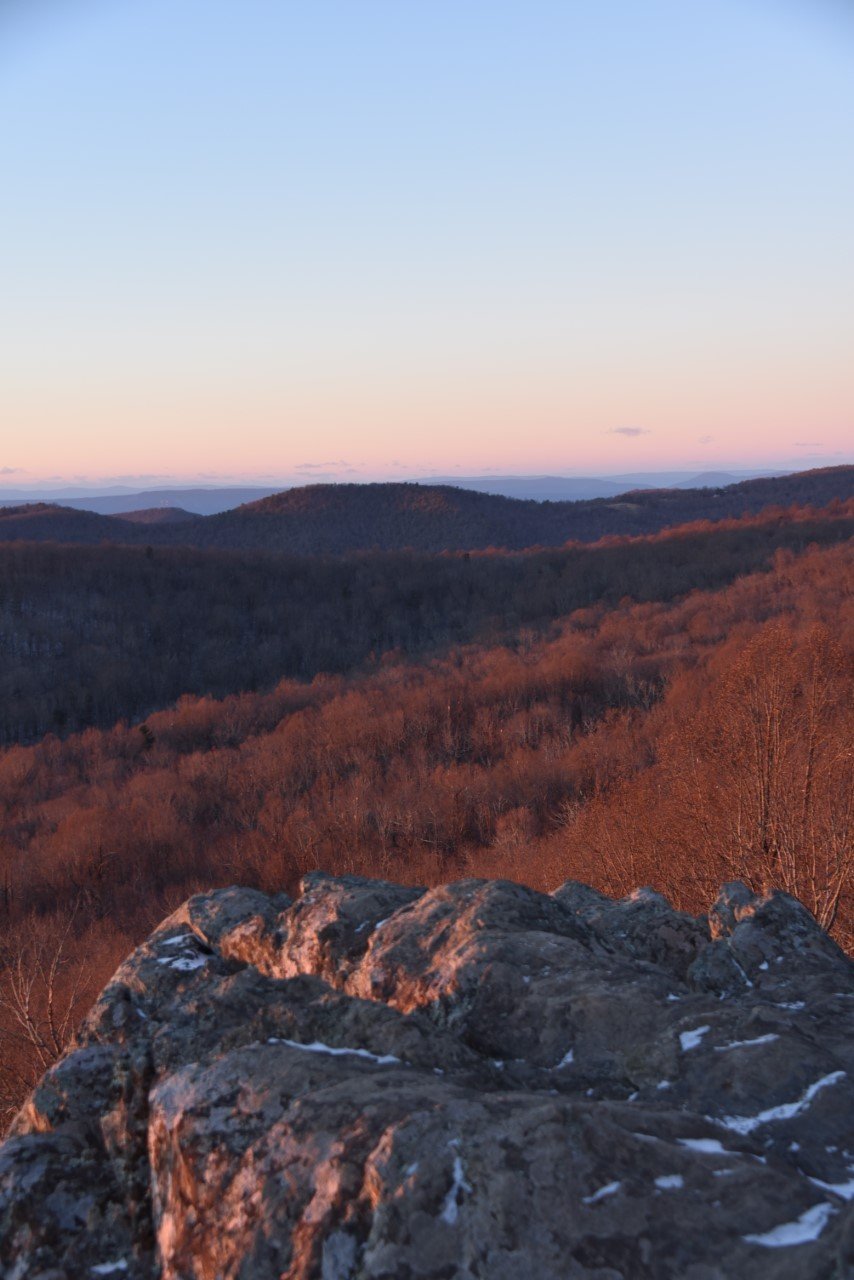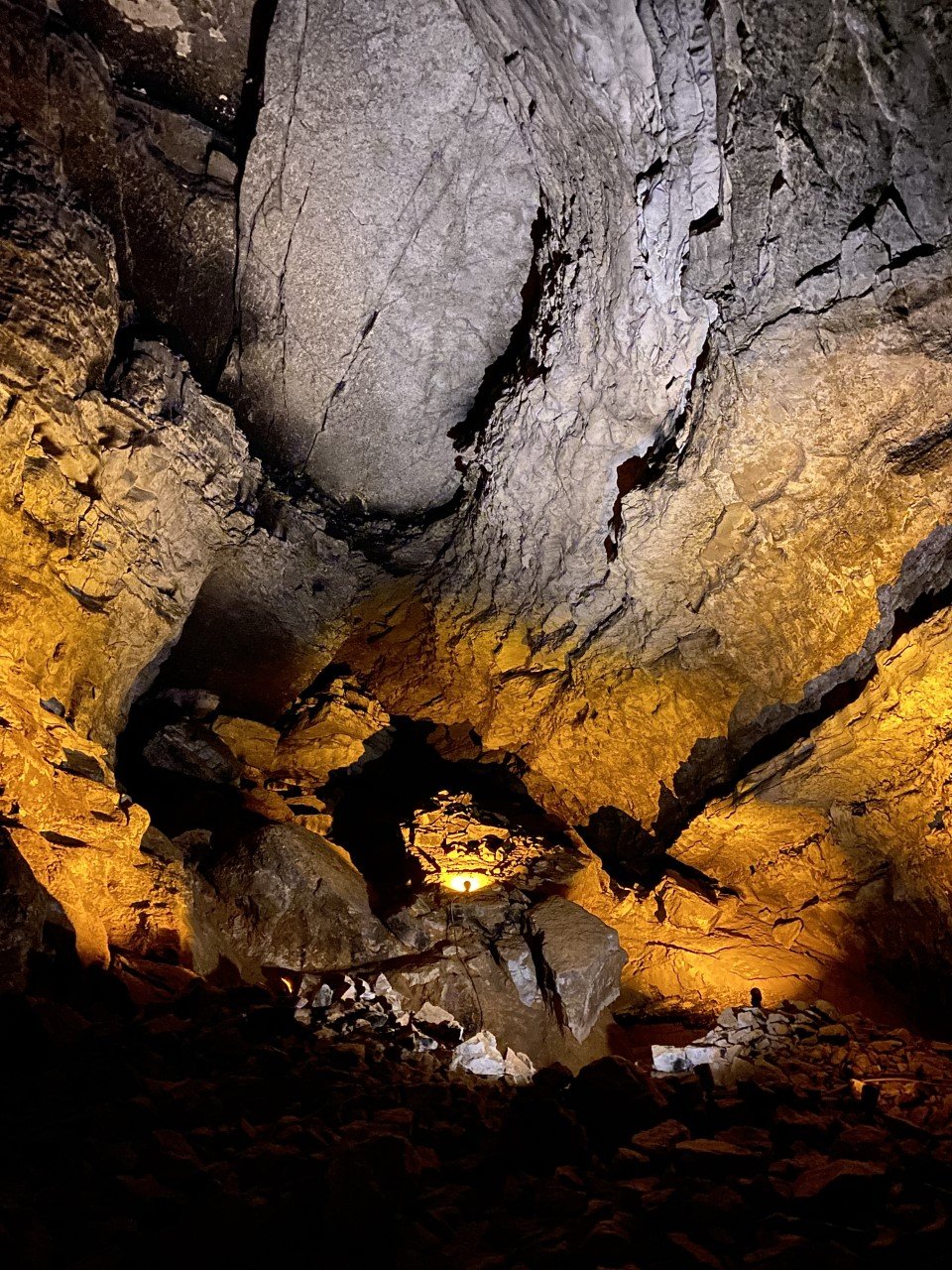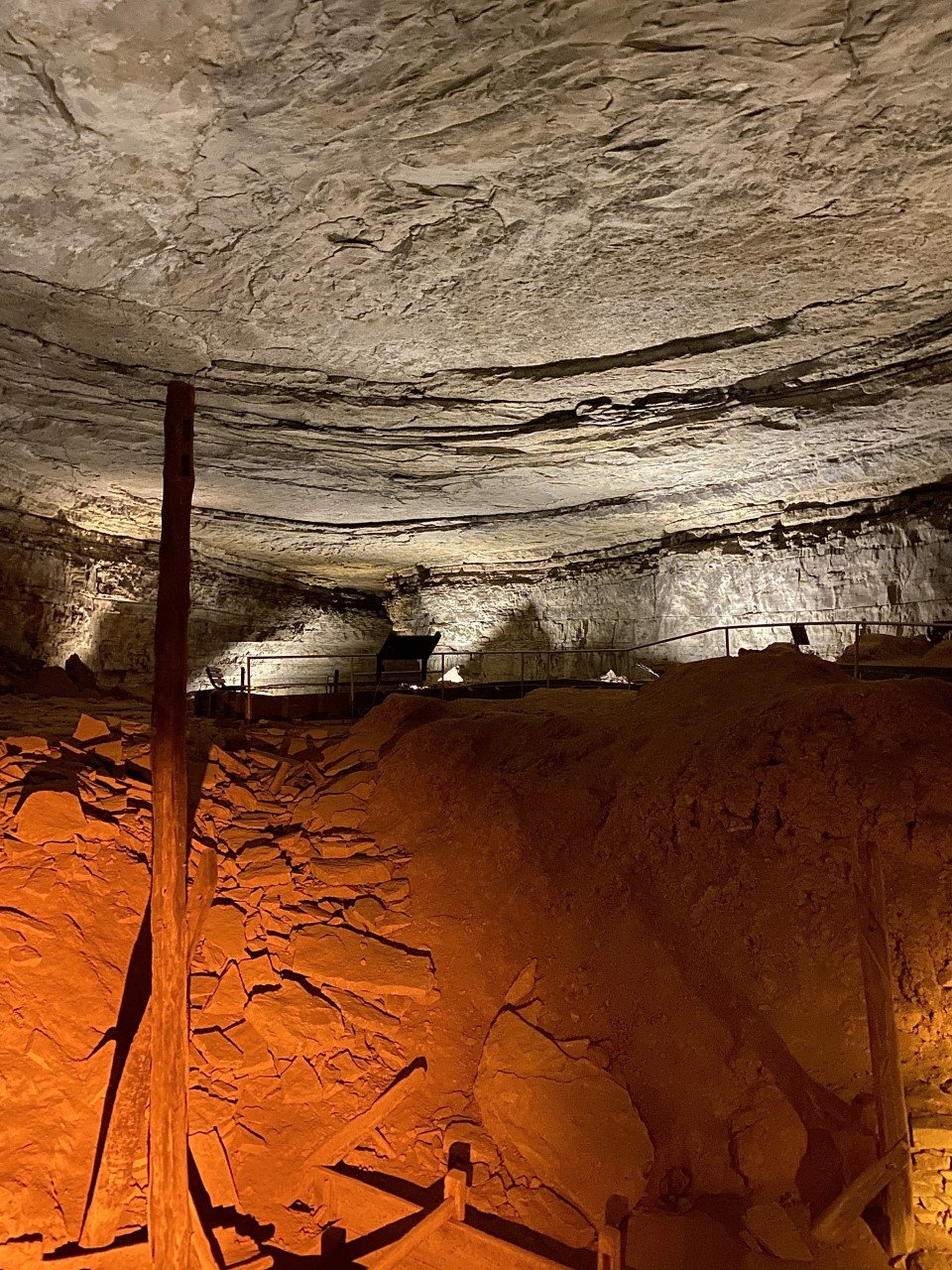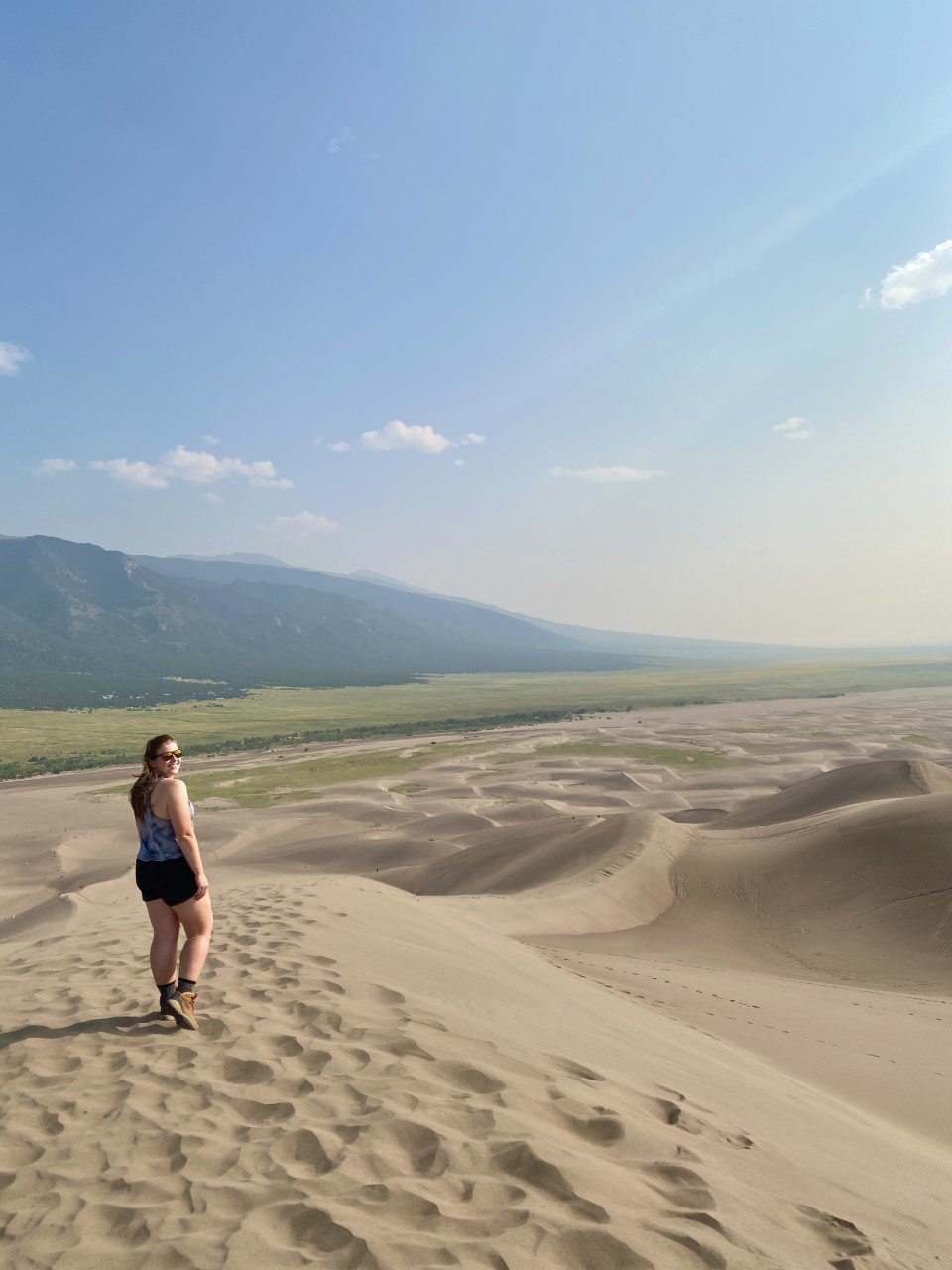Three Hikes in One Day in Virginia’s Shenandoah National Park
Here are three hikes you can take on in one day’s visit to Shenandoah National Park, including a bonus secret sunset spot:
The always stunning Appalachian Mountains from Shenandoah National Park.
In January, I noticed I had a three-day weekend without any work obligations. Naturally, to me, that means an adventure needs to be planned. I set my eyes on Shenandoah, a place I spent a day in years ago and always hoped to revisit.
Shenandoah, and Virginia in general, often feels overlooked. A hidden gem of a place, like the New River Gorge in West Virginia.
I rarely have the opportunity to visit a national park in the off-season, and of course took total advantage. From Massachusetts, Shenandoah is a 7.5 hour drive, or about eight with a gas and bathroom break stop. I took the more scenic route through the middle-of-nowhere Pennsylvania to take advantage of the lack of traffic on a Friday afternoon start of the long weekend.
Since I was planning so last minute, I didn’t set any plans for my time there. My best kept secret for lodging is booking a cabin stay at a KOA. It felt meant to be when there was one vacant cabin left at the Harrisonburg/Shenandoah KOA. Of course I had to book it. With my rewards points, my three-night stay was very affordable.
These cabins are my favorite because they’re rustic chic. It’s a definite upgrade from a tent (or sleeping in my car if we’re honest), but it’s not lavish by any means.
After my long drive, I slept in. I prepared some coffee and breakfast on the porch of my cabin, and promptly ate it inside because it turns out, Virginia gets cold. Like New England cold.
I packed several layers thinking I would not need them, but ultimately used a lot of my cold weather gear when I went hiking. Always read what park rangers in Shenandoah National Park post about the most up-to-date information on alerts and conditions in the park. Skyline Drive can be entirely (or partially) shut down due to icy conditions.
Shenandoah National Park Wildlife
The only memory I really have from my first trip to Shenandoah is a rocky summit hike I did with dad, but this was quickly overshadowed by my first bear sighting. We caught sight of a bear cub about twenty yards from us and hastened our pace back to the parking lot. Lo and behold, momma bear was on the road.
It was truly a spectacle. That I enjoyed from inside our car because I did not need to be any closer to the bear than I already had been.
It was time to make new memories in Shenandoah, so I embarked on a few hikes. Here are three hikes you can take on in one day’s visit to Shenandoah National Park:
1. Bearfence Mountain
I took full advantage of the off-season and arrived to the park before sunrise to start my day with the sun atop a summit. The best spot to catch sunrise is Bearfence Mountain. Here’s a secret: you don’t have to make it past the icy ledges to the actual summit for breathtaking, 365-degree views.
The first light on a winter morning without a car or other hiker in sight for a couple hours in the park.
I was the only one in the parking lot, at milepost (MP) 56.4 when I arrived at 7 A.M. As soon as I turned off the ignition and crossed the road to the trailhead, I remembered this was the hike I did with my dad seven years ago. The one where I saw the momma bear on the road. A fitting mountain name for this hike. As much as I love seeing wildlife, I was hoping I wouldn’t come across a bear this time around.
The trail was icy, and as always, I’m racing against the sun. I made it up about .3 miles and around 275 feet of elevation when the wind really kicked in at one of the false summits. I was alone and cold, but couldn’t wait for the sun to rise.
The summit was a bit further out, along a little more of a rocky, iced ridgeline. I decided it was best to camp where I was and enjoy the start of the day from where I was. This hike is also one of the few hikes in all of Shenandoah National Park where you catch a glimpse of Skyline Drive from a bird’s-eye-view. I love a good road photo surrounded by nature.
But what I truly loved, was feeling like I was the only person for miles on this mountain watching the sun rise. Sunrises really are the best.
When I could no longer feel my fingers, despite my gloves and hand warmers, I headed down the same way I went up. Confident as always, I ate it on one of the last steps before I made it to the road. Just Shenandoah reminding me to humble myself.
The route from Strava
Here’s the route I took. At the end of the trail, I looked at the trail map and realized there is a way to avoid the icy, rocky ridgeline that I stopped short of by hiking on the Appalachian Trail instead. Next time (and if I wake up early enough)!
2. Hawksbill Mountain
When you finish soaking up the first light to hit the Appalachian Mountains of Virginia, it’s time to head to a Shenandoah favorite, rightly so.
Shenandoah really has it figured out with all of its rocky ledges.
Right off Shenandoah National Park’s main park road, Skyline Drive, is the trail for Hawksbill at MP 45.6.
The route for Hawksbill Mountain
This hike was so nice I had to do it twice. One of my favorite aspects about it is that the summit reaches over 4,000 feet. I didn’t know any hikes further south from Massachusetts hit 4,000 feet, considering Massachusetts’ highest peak, Mt. Greylock, comes in at 3,490 feet.
In about one mile and only 500 feet of climbing, I was met with a windy, icy summit reminiscent of New Hampshire’s wintry peaks.
3. Stony Man Mountain
Stony Man was a quick jaunt, but worthwhile to see the Appalachian Mountains from a different perspective.
As the day begins to near the late afternoon, it’s time to make moves to catch sunset. You have two incredible options for sunset: one is to hike up Stony Man Mountain for jaw-dropping views of the Appalachian Mountains. Another, if you’re tired (or short on time), is to pull over at one of the overlooks and take a hidden trail to a secluded ledge. More on both options below.
A great trail leading right off of Skyline Drive is Stony Man Mountain. The parking lot is at MP 41.7. I had little to no service in the park, so I relied on the park map provided to me by the park rangers upon entering the park, as well as downloaded trail maps from AllTrails. There is also a Little Stony Man, so be sure to go for the big guy. This hike traverses the Appalachian Trail, which I loved, because it again reminded me of home back in New England.
The Strava route for Stony Man Mountain
A speedy three-quarters of a mile to the summit with roughly 300 feet of climbing brought me to this scenic spot. The other major perk of the off-season? Parking lots, trails, and summits entirely to myself. I loved every minute of it!
I would hike up Stony Man for sunset because it is short, has ample parking, and of course, the views.
Bonus Sunset Spot: The Point Overlook (MP 55.5)
If you’re short on time, or exhausted from a day full of hiking, check out MP (milepost) 55.5. Pull over and park at The Point Overlook right off Skyline Drive. You’ll find a stone wall with an empty space in it. Walk through that empty spot down the trail, roughly 300 feet.
You’ll be greeted with a rocky ledge all to yourself. I parked at The Point Overlook with two other cars, but neither party ventured on this hidden path. It’s definitely worthwhile, especially if you are short on time to run up a mountain.
Which hike is making it to your list? Would you take on all three in one day?
If you enjoyed learning about this national park, then you’ll love exploring these:
3 Hours in Kentucky’s Best-Kept Secret: Mammoth Cave NP
Two Must-Do Experiences in Florida (No, Not Disney)
The Best Time of Year to Visit White Sands National Park, New Mexico
3 Colorado National Parks To Visit (That Aren’t Rocky Mountain!)
7 Lessons I Learned Road-Tripping Across the U.S.
Visit America's Newest National Park: The New River Gorge, WV
3 Hours in Kentucky’s Best-Kept Secret: Mammoth Cave National Park
I really had to dig deep to fathom what people saw in Kentucky. Here’s what I uncovered…
When I embarked on my goal to visit all fifty states, I really had to dig deep to fathom what people saw in Kentucky. It’s inconveniently located in the U.S. It’s not close to the attractions of the western U.S., and it’s too far from Ohio and New York—what I consider to be the gatekeepers of the east for road trip lovers. Once I hit Ohio, I feel like I’m truly on a road trip.
Once I realized the state of Kentucky’s best-kept secrets lay under its surface, I knew I had to visit. Kentucky is home to the world’s longest cave system. That’s right. Little ol’ Kentucky holds the world record in cave system length. Next time you attend a trivia night, you can bet you’ll remember the name of this one.
Mammoth Cave feels suitable for the home of this world record holder. Exploring caves was never at the top of my to-do list until an unexpected trip to Carlsbad Caverns. A group of friends and I aimed to hike Guadalupe Peak down in Texas a few summers ago, and in the planning stages, we realized how close Carlsbad Caverns in New Mexico was to where we would be. Naturally we had to visit two parks in one trip. Who wouldn’t?
Slightly kicking myself for not squeezing in White Sands while I was down there, but I will gladly take another excuse to visit New Mexico again because the caverns in Carlsbad blew me away. Here I thought I was just crossing another park off my list, but the caves were stunning. The tour I went on took me through multiple football field length rooms of open space underground. It was breathtaking.
When we were road tripping down to Florida and back to Massachusetts, Kentucky didn’t look too far off on the map. What’s an extra few hours when you’re already driving over thirty hours total, right?
Kentucky is one of three states I had never visited. I truly only knew it was home to the Bourbon Trail and the Kentucky Derby. Turns out, it has a bit more to offer than that. There are countless caves to explore and outdoor things to do. We only spent a half day in the state before venturing off to one of my favorite places in the U.S. (the alluring West Virginia), but that was plenty of time to discover Kentucky’s best kept secret: Mammoth Cave National Park.
Given the poor lighting inside a cave, there is little opportunity for photos. Had to get the classic national park sign shot at the entrance of the park! This also marked park #40 out of 63 for me!
Mammoth Cave National Park became a national park in 1941 and a World Heritage Site in 1981, and it’s no surprise why. Here’s the best way to explore this gem:
Take a tour with a park ranger. The park itself has more than 400 miles of mapped out passageways underground, but only about ten miles of those are available to explore through a tour. Visitors are in luck though because there are countless tours available and they are offered year round! Explore tour options here and book a guided cave tour here. You will need to make an account with www.recreation.gov to book.
Tip: There was some service in the parking lot of the visitor center, but absolutely none inside the center. All tours begin and end at the center, so I highly encourage you screenshot your ticket confirmation to ensure a smooth tour entry.
Another tip: For those of you like me who always invest in a National Park Pass (the interagency one), unfortunately it’s not accepted here.
We signed up 3 weeks in advance for the 12:15pm Historic Tour. It’s a two-hour tour that I felt would be the best bang for our buck (and we also only had a few hours to spend in the park before departing to our next destination). As of April 2022, this tour was $20 per person.
Lucky us, we ended up on tour with an entire sixth-grade class. Nothing more relaxing for two teachers on spring break than being part of a tour of students… Thankfully the park ranger could see our enthusiasm about this, and informed the group that anyone not part of the school group would be at the front. This was ideal!
Our tour guide took us through the historic entrance and told us all about . There are still plenty of miles waiting to be discovered—eight new miles were discovered as recently as the fall of 2021!
The Historic Tour is about two miles long at a slow pace. There are plenty of stopping points, but also fun sections that aren’t for the claustrophobic adventurers out there.
The paved path thinned significantly moments after this sign and caved in vertically as well. An appropriate caution sign for what was to come.
What I found most fascinating was the story of tour guide turned explorer Stephen Bishop, who we have to thank for a great deal of the discoveries in Mammoth Cave.
This tour gave a great taste of the treat that is Mammoth Cave. Like I said before, I’m not a big cave girl, but won’t turn down an opportunity to explore one either after Carlsbad. Mammoth Cave in a few hours felt like just the right amount of time spent to not get bored or tired. There are plenty of other tours to learn more or explore further, as well as trails to walk or bike on above ground.
At the end of the tour, you exit up these stairs. Before returning to the visitor center, you are required to walk across bio-security mats to prevent a fungal disease (white-nose syndrome) from negatively impacting the caves’ bat population.
For me, three hours was just enough time to enjoy the beauty that is Mammoth Cave National Park.
Would you travel to Kentucky for this national park?
If you enjoyed this post, check out others on national parks:
Everything You Need to See in Acadia National Park, Maine
Two Best Ways to Experience Haleakalā National Park
Two Must-Do Experiences in Florida (That Aren’t Disney)
3 Colorado National Parks to Visit That Aren’t Rocky Mountain
Great Sand Dunes • Black Canyon of the Gunnison • Mesa Verde
This is in Colorado. I know, I was shocked too.
When you think of Colorado, what comes to mind? Almost immediately glimpses of Denver appear or the snow-capped summits of the Rocky Mountains range wander through your head. Denver and the Rockies definitely deserve the hype, but they aren’t all that Colorado has to offer you!
Next time you plan a trip out West, or one to Colorado specifically, add these lesser-known destinations to your must-see list. My biggest piece of advice is to purchase the Annual Parks Pass ($80). If you do a Southern Colorado trek, each of these parks have entrance fees of $15-$30, so it may be more beneficial to pay the one-time $80 cost. I’m all about saving money where I can! I happened to also be trekking to Moab, Utah, so I knew I’d save since I was also entering three parks there that each have an entrance fee.
Last summer on a cross-country road trip, the ultimate destination was Idaho. How to get there, however, was up for discussion. After some great Kansas City barbeque, Colorado seemed like it was just minutes away, so I planned for that state next on the itinerary.
Colorado is home to four national parks— one of which is way more popular than the others. Rocky Mountain National Park is well-known for good reason! It’s easily accessible from Denver and it’s breathtaking. I visited the park a few years ago, so I opted out of revisiting this time around.
Instead, I traversed southern Colorado exploring the other national parks this gorgeous state has to offer. And what I discovered is that they are each true gems that not many people know about!
While you need a permit now to enter Rocky Mountain National Park due to its extreme popularity and congestion (4.4 million visitors in 2021!), the remaining three national parks have so few visitors it’ll feel like you have the park to yourself at some times.
Though I love a good tourist moment like when you first lay eyes on the Rockies, or when you witness the exact point when Ol’ Faithful erupts, I also take great pleasure in those quieter moments. The ones that not many are able to experience.
Here are the national parks that you should definitely visit in Colorado:
1. Great Sand Dunes National Park
We all know Colorado has the mountains, but sand dunes? And North America’s tallest ones at that?
In the southwest pocket of Colorado, in the town of Mosca, that’s exactly what you’ll find. A striking mountain range that serves as a backdrop to the sheer beauty of sand several hundred feet in the sky, seemingly out of nowhere.
There are three dunes that top all the others: High Dune, Star Dune, and Hidden Dune. For all three, park at Dune Parking just past the Visitor Center.
High Dune isn’t the tallest dune, but it is the quickest to get up. If you are only passing through the park, this is the perfect one to tackle. From the parking lot, head straight up the dunes. It’s a little under 700 feet and about three miles total.
Star Dune and Hidden Dune are the tallest – Hidden is slightly taller than Star. These two are longer treks (around 6-7 miles).
This park is one of the least visited (as are the other two on this list). In 2019, Great Sand Dunes had 527, 546 visitors. Obviously that number has risen with the increase of road trips and stateside travel, but it’s still nowhere near the looks of visitor numbers in popular parks.
Tips: Start early or go later in the afternoon. Sand can really heat up. If you’re into it, rent a sandboard from town to save yourself time once you hike up. There is a water station at the parking lot to rid yourself of sand. Though it might stick around for longer than you’d like!
Best time of year to visit: Fall or winter to see the contrast of the mountainscape behind the dunes. Summer brought welcomed warmth on a windy day at the dunes. You can’t go wrong!
Where to stay: The dunes can be a day trip, but if you want to take advantage of seeing the stars at night, I would camp within the park at the designated campground, Piñon Flats.
2. Black Canyon of the Gunnison National Park
The Black Canyon is one of the few places I’ve visited that left me in utter awe. This park truly is phenomenal. Located right by the charming, small town of Montrose, this park is a hidden gem. Considering it is one of the deepest canyons, it makes sense it isn’t visible to most people.
The drive in isn’t too captivating, but as soon as you stop at the first overlook, the jagged rock structures and sheer darkness along the canyon edges will surely give you a reason to not look away.
The Gunnison River in all its glory.
This park only had 432, 818 visitors in 2019. That blows my mind. There is truly something for every explorer at this park. World-renown fishing, incredible hikes, and stunning vistas.
I recommend driving down South Rim Road and stopping at each view along the way. Each trek is short and provides new angles of the canyon. I couldn’t get enough of its depth!
Tips:
Spend two days in this park. One day can be spent exploring all the overlooks and going on short hikes to see the true depths of this canyon. The next day can be spent with an obtained permit to go down into the canyon on the Gunnison route. This route is an incredible 2.7 mile hike with 1,700 ft elevation gain. The trail is minimally marked and a very limited number of hikers are allowed each day, fueling the intensity of this hike.
The first viewpoint from the entrance of the park opens up to this scaping view of the Black Canyon.
Best time of year to visit: Summer. This park is so infrequently visited that parking wasn’t an issue, neither was overcrowding at any lookout point. The roads are also closed in winter, so that’s something to keep in mind.
Where to stay: KOA in Montrose, CO. This KOA is very affordable and conveniently close to both the main street and the park. As with most KOAs, you can camp in a tent or stay in a cabin!
3. Mesa Verde National Park
These cave dwellings were built around the end of the 12th century. How wild is it that we can view (and walk among them) today?
I have had this park on my list from the beginning of my park journey. Famous for the cliff dwellings, this park was designated a UNESCO World Heritage Site in 1978. One of the first in the United States!
Despite how incredible this park is, only a little over half a million people visited in 2019 (556,203).
I did a self-guided exploration of this park for half a day, soaking in the cliff dwellings from every angle I could and from every lookout point possible. I suggest driving along the Mesa Top Loop. This road will give you access to neat stops like the Sun Point View and views of the cliff dwellings. If you’re short on time, definitely take a ride along this loop road to absorb as much as you can.
I love imagining what it would’ve been like to discover places like this (and Machu Picchu) for the first time. Here is a cave dwelling from an overlook point.
Tips: For guided tours, book in advance! There’s nothing worse than arriving at a new park, hopeful to see something, only to find out it’s booked. You can book your guided tour here.
Best time of year to visit: Almost every season. Seriously! I visited in August and never struggled for a parking spot. It’s very unvisited, which makes it quite the hidden gem. However, if you really want to take a guided tour, you need to visit May-October as they are not offered in the winter and spring months.
Where to stay: Cortez/Mesa Verde KOA Journey in Cortez, CO.
Have you visited any of these Colorado national parks? Which one is on your list?
Loved this post? Then you’ll love these:
Visit America's Newest National Park: The New River Gorge, WV
Experience the Best of Hawaii’s Haleakalā National Park







